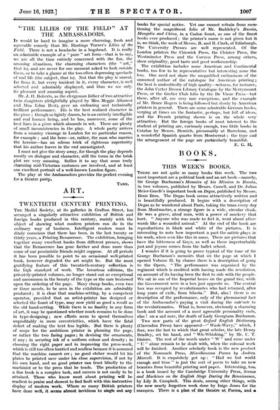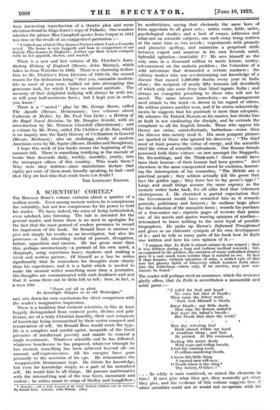BOOKS.
THIS WEEK'S BOOKS.
THERE are not quite so many books this week. The two most important are a political book and an art book—namely, Sir George Buchanan's Memoirs of his Mission to Russia, in two volumes, published by Messrs. Cassell, and Dr. Julius Meier-Graefe's important book on Degas, published by Messrs. Bean Bros. The Degas book seems attractively written and is beautifully produced. It begins with a description of Degas as he wandered about Paris, taking the tram every day from Montmartre, a strange figure in a wide, circular cloak. He was a grave, aloof man, with a power of mockery that hurt. " Anyone who was made to feel it, went about after- wards like a wounded animal." At the end of the book are reproductions in black and white of the pictures. It is interesting to note how important a part the satiric plays in his work, when seen like this in mass. There are pictures that have the bitterness of Goya, as well as those imperturbable just and joyous scenes from the ballet school.
I wonder if it is going to prove typical of the tone of Sir George Buchanan's memoirs that on the page at which I opened Volume II. by chance there is a description of going to the Opera. " The performance was organized by the regiment which is credited with having made the revolution, on account of its having been the first to side with the people. We fat in one of the Imperial boxes on the grand tier, while the Government were in a box just opposite us. The central box was occupied by revolutionaries who had returned, after long years of exile, from Siberia." But, alas ! there is no description of the performance, only of the phenomenal fact of the Ambassador's paying a visit during the entr'acte to the revolutionaries. 'What is, however, obviously a charming book and the account of a most agreeable personality ends, alas ! on a sad note, the death of Lady Georgians Buchanan.
Two new parts of the great Oxford English Dictionary (Clarendon Press) have appeared—" Wash-Wavy," which, I fear, was the last to which that great scholar, the late Henry Bradley, set his hand, and " Wh-Whisking," by Mr. C. T. Onions. The rest of the words under " W " and some under " U " alone remain to be dealt with, when the colossal work will be finished. Another scholarly book is the new product of the Nonesuch Press, Miscellaneous Poems by Andrew Marvell. It is exquisitely got up : " Had we but world enough and time " is just the sort of poem to take on new beauties from beautiful printing and paper. Interesting, too, is a book issued by the Cambridge University Press, Scenes and Machines on the English Stage During the Renaissance, by Lily B. Campbell. This deals, among other things, with the now nearly forgotten work done by Inigo Jones for the masques. There is a plan of the theatre at Parma, and a
very interesting reproduction of a theatre plan and scene elevation found in Inigo Jones's copy of Palladio. One wonders whether the phrase Miss Campbell quotes from Coryat in 1611. was true or the result of an exaggerated patriotism
" I visited one of their Play-houses (Venice) where I saw a Comodie acted. The house is very beggarly and base in comparison of our stately Play-houses in England ; neither can their Actors compare with us for apparell, shewes, and musick."
There is a new and last volume of Mr. Fletcher's Intro- ductory History of England (Messrs. John Murray), which
takes us from Waterloo to 1880. There is a charming dedica- tion to Mr. Fletcher's Eton Division of 1918-19, the second reason for the dedication being " that you, miserable modern- ists as most of you were, bullied me into attempting this gruesome task, for which I have no natural aptitude. The memory of that delightful bullying will always be with me, as will your half-mutinous faces ; but I kept you in order, you know."
There is a " sacred " play by Mr. George Moore, called The Apostle (Messrs. Heinemann) ; two volumes about Catherine de Medici, by Mr. Paul Van Dyke ; a History of the Royal Naval Division, by Mr. Douglas Jerrold, with an introduction by Mr. Winston Churchill (Hutchinson) ; and a volume by Mr. Perry, called The Children of the Sun, which is an inquiry into the Early History of Civilization in General (Messrs. Methuen) ; also an Anthology chiefly of modern American verse by Mr. Squire (Messrs. Hodder and Stoughton). I hope this week of less books means the beginning of the
summer lull. There. is something terrifying in the cascade of books that descends daily, weekly, monthly, yearly, into
the newspaper offices of this country. Who reads them ? Why were they written—since statisticians declare that eighty per cent. of them must, broadly speaking, be bad—and
that they are bad who that reads them can doubt ?
THE LITERARY EDITOR.







































 Previous page
Previous page